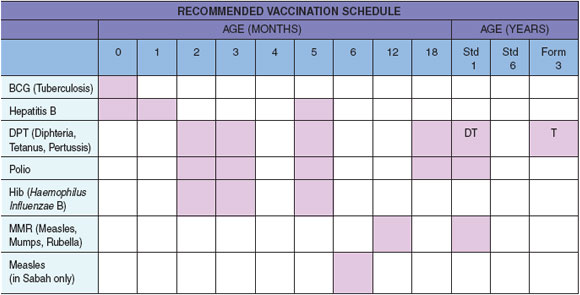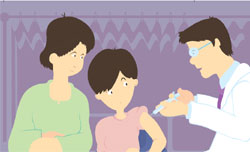Daily pressures can make you forget to follow up on your child’s immunisation needs and, thus, put his life in danger.
Today’s lifestyle is a hectic whirlwind where both parents may work to meet expenses. When time goes by in a flash, parents can unintentionally forget important things; one of them being follow-up immunisation for their kids.
It is extremely important for babies and children to be vaccinated over a period of time (please refer to the schedule below). If your children do not get their follow-up shots, you are leaving them open to the risk of contracting dangerous diseases.
At birth, all babies are immunised at hospitals and parents faithfully bring their babies in for their follow up shots until babies are 3 months old.
Then mothers return to work and this is when they tend to forget about the booster shots. Long working hours, crazy deadlines and work stress can push baby’s vaccination appointments with the doctor out of the way.
Baby being unwell on the appointment date may also contribute to shots being missed. Although it is safe to vaccinate baby when he has a slight running nose or cough, most parents prefer to postpone until baby is better. This, unfortunately, throws mom’s and baby’s schedule into disarray The problem may only come to light when baby is due for the next shot.
Shots also tend to be more easily missed when baby comes along years after his older brothers and sisters have grown up. Mom may have to get accustomed to raising a baby all over again and unintentionally forget his booster shots.
In some cases, the shots are not forgotten but simply neglected. Being in a relatively developed country with a low incidence of complications from immunisable diseases, it’s easy for some parents to be lulled into a false sense of security. However, let’s not forget that the diseases may once again rear their ugly heads if we fail to either immunise our children or ensure that they get their booster shots (see boxed article, Immunise Your Child Against These Deadly Diseases).
If you realise that you have missed your child’s booster shots and now want to catch up with them, see your doctor. Don’t worry that your doctor will scold you. Doctors are there to help ensure that your child is wellprotected (they do not eat children or their parents). They will be able to advise you on what to do.
Handy Reminders For Booster Day
At Home
- Hang calendars around your house and mark the booster dates on the calendars that you see and use most often.
- Write booster dates down on a note and stick it on your fridge. If you already have lots of notes and bills on your fridge, then make sure that the booster note sticks out prominently.
- Write the dates down on a note and use the note as a bookmark if you are an avid reader.
- Write the dates into your diary if you keep one.
- Key in the dates into your PDA or handphone and set the reminder alarm.
At The Office
- If you have a secretary, get her to remind you.
- Write the dates down and stick it on the wall right next to, or in front of, you.
- Plan booster day as one of your leave days.You will not forget your holidays so make booster day a holiday with a mission.
With Your Doctor
- If your doctor is a private practitioner, you can request that the clinic call to remind you of the next follow up immunisation appointment.
Gear Up For Booster Day
- If you need someone to take you and your child to the clinic on booster days, make prior travel arrangements.
- Arrange for someone to take care of your other kids on booster day and maybe even for someone to take them to school.
IMMUNISE YOUR CHILD AGAINST THESE DEADLY DISEASES
- Hepatitis B. This disease can cause your child to develop yellow fever and put him at an increased risk of getting liver cancer later. Hepatitis B is transmitted through contaminated body fluids. Immunisation is, therefore, particularly important if you are a carrier.
- DPT. Diphteria is rare today. However, failure to ensure adequate immunity may lead to its resurgence, resulting in disability and even death. Pertussis can put a child at risk of lung damage. Tetanus remains a threat especially amongst children who may sustain injuries from rusty metals, penetrating injuries or snake bites. Booster doses are usually given following such injuries, in addition to booster doses given in school. In addition, pregnant mothers are often given a tetanus booster in their third trimester to reduce the risk following delivery.
- Polio. Although extremely rare, this disease is still very serious. It can cause paralysis and in severe cases can lead to death.
- Hib. The Haemophilus Influenzae B organism can cause meningitis, deafness and brain damage even with antibiotic therapy. Prevention through immunisation remains the best option.
- MMR. Although common childhood diseases, measles, mumps and rubella are not without risks. Measles in acute stages can cause diarrhoea, pneumonia (particularly in very young or immunocompromised children), convulsions, meningoencephalitis, and can lead to brain and lung damage, and even death. Mumps, on the other hand may cause sterility in males, something which may not come to light until the unfortunate child is all grown up and married. In rare instances it may lead to pancreatitis, an inflammation of the pancreas. One aim of immunising children against rubella (or German Measles as it is commonly known) is to minimise the risk of transmission to pregnant mothers as this may result in baby being born with multiple defects. The other aim is to also ensure that when girls marry and become pregnant, they are immune to rubella, thus conferring protection on their unborn foetus.








Comments